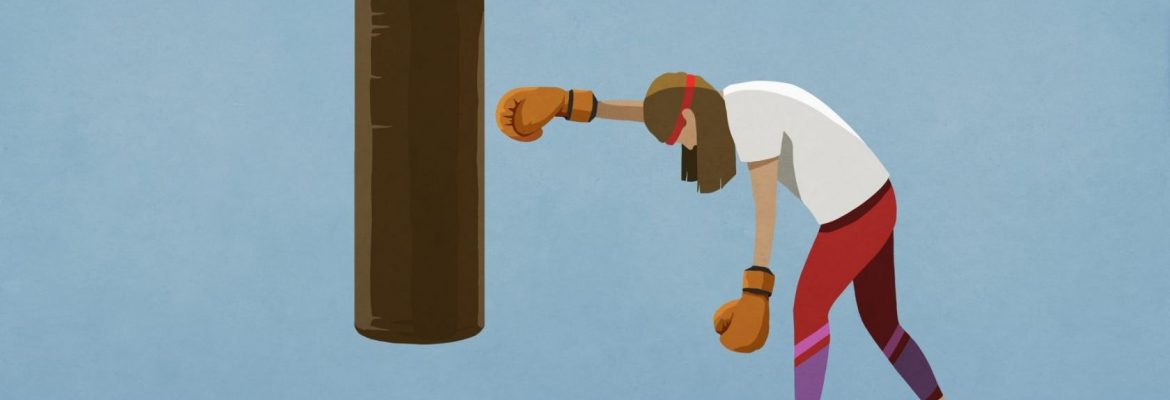Here’s why having energy dips is a sign of good hormonal health
Concerned that you’re often too tired to work out in the week before your period? Wish you had round-the-clock energy? Strong Women editor Miranda Larbi explains why not having energy 24/7 is actually a good thing.
Hands up if some weeks, one coffee’s enough and others, you struggle to make it through the afternoon. Given the fact that we work hard, train daily, concentrate on nutrition, try to maintain our social lives and spend time with our families, it’s no wonder we’re sometimes flat out. It’d be far more weird if we were full of beans day in, day out.
But you know what isn’t normal? Not having dips in energy. In fact, it was my own Duracell-like capacity for energy that first alerted me to the possibility that I might not be hormonally balanced. A few years ago, I was doing a training programme at a small gym. The PT remarked one day that it was amazing how I never seemed to get tired. I was able to push through brutal workouts five days a week, four weeks a month, with no variation in weight lifting ability, training capacity or rest requirements. It was only after I admitted that my periods had in fact stopped, that it was suggested I stop the programme.
You may also like
Exercise and periods: can a fitness regime reduce period pain and regulate the menstrual cycle?
Today, with two years of regular periods under my belt, I’m far more predisposed to energy fluctuations. And although I’m still the kind of person who prides themselves on pushing through tiredness, I definitely do have weeks when runs feel easier and gym sessions are surprisingly successful, compared with others.
All this is as it should be, says Renee McGregor, leading sports dietitian. We should feel slightly different every day, and that’s because our hormones affect us differently every single day. “But equally, it’s the lifestyle factors and the hormones together that can infiltrate your energy levels,” she tells Stylist. “We know there are certain points in the cycle where you’re probably going to feel more tired without a doubt, and especially if you don’t understand what’s going on, your behaviour might enhance that.”
It’s healthy and normal to experience energy dips
To put menstruation simply, you’ve got your follicular, luteal and ovulatory phases. Generally speaking, it’s in the follicular phase that your oestrogen and progesterone are fairly flatlined. As you get closer to ovulation, follicle-stimulating hormone (FSH) and lutinising hormone (LH) rise and then oestrogen rises. When progesterone becomes dominant in the luteal phase, you might start to notice PMS-type symptoms. “You’ll definitely need to use more carbs for fuel at that point and if you’re not and you’re trying to do too much exercise at that point, you’re going to feel rubbish,” McGregor says.
A lot of women also notice a change in their heart rate at that time, with it rising in the second part of their cycle. If you don’t track your heart rate, you may just notice that the same workout you did two weeks ago is now feeling much harder. That’s not to say that you need to change anything at any point of your period; McGregor doesn’t agree with telling women that on day seven of their cycle, they must eat X, Y or Z and you must train a certain way because the science simply doesn’t exist to back that up yet.
Energy is different if you don’t have periods
But what if you’re on the pill? My own issues started a year after coming off the pill, which I’d taken for years and which had controlled my mood and energy levels (again, no dips or rises). McGregor explains that certain contraceptives will downregulate your hormones meaning that you probably won’t get the same ups and downs as other women. For those who are on the combined pill and who take a monthly break, a slight change in mood and energy may be felt but McGregor wonders whether that’s in part psychosomatic. “I wonder if that is slightly more placebo because if you’re expecting a bleed, you might expect to feel a bit rubbish,” she says.
My periods went AWOL for two years, during which time I started to wonder if PMS was a bit of a myth. After all, I felt emotionally and energetically the same all year long – which I’d assumed was healthy.
In actual fact, however, my sex hormones had been knocked out of kilter by cortisol (stress) – something common in people living with Relative Energy Disorder in Sport (RED-S). McGregor explains that when you’re in RED-S, “everything’s flatlined. You’re not going to see energy disruptions due to hormones but you may still have energy dips due to (lack of) foods”. In my case, I was so disconnected that I’d push through with training without really clocking if I felt energised or not.
Why women’s energy is fundamentally different to men’s
The hard thing, in my experience, is understanding your energy levels in comparison with men. If you, like me, often work out with a male housemate or partner, then it’s easy to try to compete against them. That, McGregor says, is a pointless task as “men don’t have to work as hard to get the performance outcomes that women do”.
We have to work significantly harder to get the same performance outcomes because we don’t have testosterone in the same supply as men, she points out. She suggests that, if you do train with a guy, it’s worth getting to know your cycle so you can anticipate the weeks in which you might find your regular workouts more challenging – and talking about that fact with your training partner.
For more hormone-related fitness content, check out the Strong Women Training Club.
Images: Getty
Source: Read Full Article
